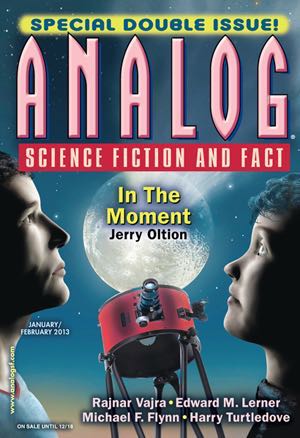Analog Science Fiction and Fact, January/February 2013
Reviewed date: 2012 Dec 10
192 pages
192 pages
Both novellas involved time travel, and since I don't enjoy time travel stories, well, I didn't much like this issue of Analog. One bright spot is Descartes's Stepchildren; the idea that up to a fifth of humanity might be unconscious automatons fascinates me. And I truly enjoyed Michael F. Flynn's explanation of how the various solar system models developed, which explains why geocentric models prevailed for so long--it's because they did a better job of explaining the observed planetary movements, until quite recently.
- Novella: "The Woman Who Cried Corpse" by Rajnar Vajra - When Ali goes to the hospital to be with her dying mother, she ends up being pursued by killer assassins, and later discovers her mother has kind-of sort-of time traveled due to an experiment that happened years ago.
- Novella: "Time Out" by Edward M. Lerner - Another stupid, paradoxical time travel story. A genuine mad scientist invents a working time machine, is driven even more psychotic by his future self's refusal to send back any useful information about how to prevent tragedies, and eventually ends up completely dead.
- Novelette: "The Exchange Officers" by Brad R. Torgersen - Two "astronauts" operating remotely-controlled robots must fight off a Chinese invasion of a key American space platform.
- Novelette: "Descartes's Stepchildren" by Robert Scherrer - A neuro-scientist develops a test that can detect and locate the brain's center of consciousness, but that reveals that nearly 20% of humans are Blanks lacking self-awareness.
- Novelette: "Buddha Nature" by Amy Thomson - A runaway robot joins a monastery and seeks enlightment.
- Novelette: "True to Form" by Kyle Kirkland - A down-and-out pharmacologist discovers that one of his former friends is--or has--developed mechs (vat-cloned humans) that can pass as human.
- Short story: "In the Moment" by Jerry Oltion - Amateur astronomers watch a Comet Davis through their telescopes to see if it will hit the moon and thereby cause disaster on earth.
- Short story: "The War of the Worlds, Book One, Chapter 18: The Sergeant-Major" by John G. Hemry - Intended to be amusing, but mostly just aggravating; an account of how a British Sergeant-Major Richardson cleanly and efficiently dispatches a Martian invader.
- Short story: "Neighborhood Watch" by H.G. Stratmann - The entire solar system is so disgusted by humanity that they hide themselves, leaving humanity to think itself alone in the universe.
- Science Fact: "The Great Ptolemaic Smackdown and Down-and-Dirty Mud-Wrassle" by Michael F. Flynn - The real story behind why it took so long to replace geocentrism with heliocentrism (hint: it's because the geocentric models actually worked better until quite recently.)
- Special Feature: "Time, Place, and Wonder: The Use of Setting in Short Fiction" by Richard A. Lovett - Some tidbits of advice, like how to make sure the setting works realistically (e.g., model your fictitious house after a real house. That way you won't accidentally describe a geometrically impossible floor plan.)
- Short-short: "We Install" by Harry Turtledove - Looks like traveler three is growing mold--time to replace the solar system.
- Short-short: "Unplanned Obsolescence" by Edward M. Lerner - Irritated the continual updates required just to watch a little entertainment on your computer, phone, or television? You might just die of frustration.
